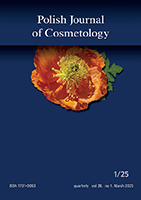search by
Copyright @ Pol J CosmetolRole of unsaturated fatty acids in the treatment of selected dermatological disordersAleksandra Werner, Bogusława Pietrzak Zakład Farmakodynamiki, Wydział Farmaceutyczny, Uniwersytet Medyczny w Łodzi Summary Unsaturated fatty acids have proven therapeutic effects in inflammatory and autoimmune diseases. Consuming adequate amounts of omega acids can effectively reduce inflammation, which is beneficial in the therapy of inflammatory skin diseases such as atopic dermatitis, psoriasis and acne. In the case of acne, ω-3 and GLA acids have been shown to reduce acne lesions by inhibiting TLR signalling pathways and lowering levels of pro-inflammatory cytokines. Atopic dermatitis (AD) is associated with defective skin barrier function and abnormal fatty acid metabolism. Fish oil supplementation containing EPA (eicosapentaenoic acid) and DHA (docosahexaenoic acid), which have anti-inflammatory effects, can alleviate AD symptoms. The use of GLA-rich oils improves skin hydration and reduces epidermal water loss. The skin of patients with psoriasis shows higher levels of arachidonic acid (ARA) and its metabolites, leading to damage to various tissues. Supplementation with ω-3 PUFA (polyunsaturated fatty acids) such as EPA and DHA, competes with inflammatory ARA, reducing the production of pro-inflammatory eicosanoids and cytokines, mainly IL-6 and TNF-α. It has been shown that fish oil supplementation can alleviate psoriasis symptoms by reducing pro-inflammatory factors and improving skin barrier function. In the treatment of rosacea, restoring skin barrier function is key. Findings suggest that omega-3 PUFA supplementation can improve dry eye symptoms in patients with ocular rosacea, reducing subjective dry eye symptoms. Skin ageing is associated with reduced sebaceous gland activity and changes in lipid metabolism, leading to dry skin. Unsaturated fatty acids used in the treatment of ageing skin, improve skin hydration, elasticity and increase collagen and elastin synthesis. Key words: unsaturated fatty acids, omega 3, omega 6, acne, psoriasis, atopic dermatitis, skin ageing |




